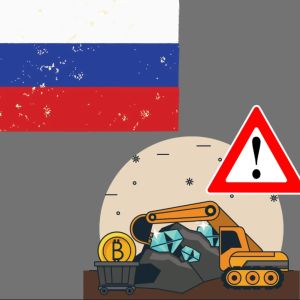The Russian government has approved restrictions on cryptocurrency mining operations across multiple regions, which will take effect on January 1, 2025. The resolution, reported by Russia’s TASS , outlines total bans in several territories and seasonal restrictions in others, extending through March 15, 2031. This marks a major shift in Russia’s approach to cryptocurrency mining, balancing the country’s position as a major mining hub with growing concerns about energy consumption and regional economic disparities. This policy comes at a crucial time, as Russia has only recently legalized and begun regulating cryptocurrency mining at the federal level. The regulation requires miners to register with tax authorities and comply with specific energy usage limits. Russia’s crypto mining affects different regions The mining ban affects two distinct categories of regions, each with specific restrictions and timelines. The first category includes complete bans in several regions: all six North Caucasus republics (Dagestan, Ingushetia, Kabardino-Balkaria, Karachay-Cherkessia, North Ossetia, and Chechnya), along with the Donetsk and Lugansk People’s Republics and the Zaporizhia and Kherson regions. These areas face total prohibition of all mining activities, including participation in mining pools. The second category introduces seasonal restrictions in specific areas of the Irkutsk Region, Buryatia, and the Zabaikalsky Krai. These regions will face mining bans during peak energy consumption periods. For 2025, the initial restriction period runs from January 1 to March 15. The seasonal ban will be in effect annually from November 15 to March 15 through 2031. This aligns with periods of peak energy demand during the harsh Russian winter. The government has maintained flexibility in its approach, with the Cabinet of Ministers confirming that the list of affected regions can be adjusted based on recommendations from the government commission on electric power development. Russia’s energy policy The Russian government’s mining restrictions originated from a mix of energy economics and regional subsidies. According to Sergey Kolobanov, deputy director at the Center for Strategic Research, the ban addresses more than just electricity shortages. At its core, the policy tackles what experts call “interregional cross-subsidization.” This is a system where electricity costs in certain regions are artificially lowered through subsidies effectively paid for by consumers and producers in other parts of Russia. This subsidization creates economic imbalances that cryptocurrency mining operations have been exploiting. Vladimir Klimanov, Director of the Center for Regional Policy at the Presidential Academy, explains that residents and businesses in central Russia have traditionally shouldered part of the costs arising from lower electricity tariffs in regions like the North Caucasus and the Far East. The 2031 end date for these restrictions aligns with Russia’s broader energy market reform timeline. As Kolobanov points out, this period corresponds to the planned elimination of regional electricity benefits. Once the market achieves full liberalization, these mining restrictions could potentially be lifted, provided the regions have developed the necessary power generation capacity. Russia’s changed stance on crypto mining Russia’s approach to cryptocurrency mining has changed into a structured regulatory system since November 2024, when mining became officially legal under specific conditions. The cornerstone of this framework requires miners to report their digital assets and wallet addresses to the Federal Tax Service (FTS). The FTS has implemented a mandatory registration system for mining operations, with different requirements for various categories of miners. Business entities, including individual entrepreneurs and legal entities, must register through a dedicated FTS service launched on November 1. For individual miners, the government has set a monthly electricity consumption cap of 6,000 kilowatt-hours, creating a clear distinction between personal and commercial mining operations. Miners must register their operations and report their earnings. They also need to operate in permitted regions and time periods. The combination of federal registration requirements and regional restrictions could indicate that Russia wants to balance the economic opportunities of cryptocurrency mining with energy security. Land a High-Paying Web3 Job in 90 Days: The Ultimate Roadmap










